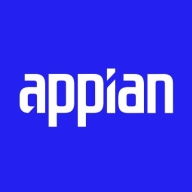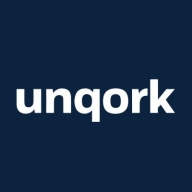

Appian and Unqork compete in the low-code and no-code application platform category. Appian seems to have the upper hand due to competitive pricing and well-regarded customer service.
Features: Appian offers rapid low-code development, robust process design, and built-in functionalities suitable for business use cases. Its frequent updates and strong integration capabilities make it effective for agile workflow creation. Unqork excels in its no-code platform, advanced UI components, and enterprise integrations, enabling quick development cycles and dynamic form capabilities.
Room for Improvement: Appian users note issues with customization, particularly offline capabilities, scalability, and UI customization. There are challenges with devops integration and limited error reporting. Unqork's improvements are needed in performance, mobile support, and learning resources. Users require enhanced analytics, flexible UI customization, and better scalability for complex workflows.
Ease of Deployment and Customer Service: Appian supports diverse deployment options, including public cloud, hybrid, and on-premises setups. Its customer service is praised for responsiveness and efficiency. Unqork, primarily cloud-based, has some criticism for its technical support, with users desiring more comprehensive resources for complex issues.
Pricing and ROI: Appian offers competitive pricing with flexible licensing options. It boasts a strong ROI from rapid break-even and process efficiencies. Unqork, considered premium due to higher certification and licensing, is valued for its no-code capabilities but has less clarity in ROI for organizations assessing total costs versus benefits.
They see return on investment in terms of cost savings, time savings, more efficient processes, and more efficient employees.
Appian is very efficient, allowing us to build a lot of applications within a financial year, making it cost-effective.
The platform provides default workspaces, and managing or increasing space is easier compared to other platforms.
Using Unqork has resulted in improved cost-saving, time-saving, and resource-saving benefits for our projects.
Two to three projects saw a twenty to thirty percent reduction in workload, indicating a profitable pricing structure.
Their customer service is responsive, and the team is very prompt for support.
The technical support for Appian rates as 10 out of 10 because they have a great support team.
The technical support is generally good.
I rate their technical support as excellent.
The Unqork community portal and academy provide extensive information, with 60 to 70% of required information readily available.
The Unqork community helped integrate features like colored status indicators using JavaScript.
On a scale of one to 10, Appian rates as a nine for scalability.
Initially, without much coding, I can easily handle five thousand records.
Appian is scalable, but it depends on how you build your applications.
Its cloud infrastructure simplifies global access to data and services without the fear of losing data.
Scalability features like UI and APIs are all available within the same platform, making it easy to handle increased demands.
Not every project can be executed through Unqork as some complex requirements might need proof of concept before proceeding.
It depends on how it has been designed and how it has been configured.
The stability of Appian would rate as nine, as it's a stable environment.
A component's previously set value might be missing the next day, affecting reliability.
The main issue I have with Unqork is the limited availability of learning resources.
There have been no significant stability issues where the entire platform went down.
It has room to improve for use cases where the users are public facing, where anonymous users could come to a site and run a business workflow or interact with some data.
If there is a very complex process that includes a lot of data transitioning and memory-centric processes, it consumes a lot of memory.
I would like to see more enhancement in the user interface to allow more freedom in designing the sites and pages.
Unqork moved from the Sanctuary to Vega platform without providing a migration tool, necessitating manual updates.
The setup for API calls was initially challenging, especially when dealing with service logs and transforming large JSON codes for validation and PDF generation.
It would be beneficial if they further improved compatibility with both the previous Sencha compiler and the new Vega compiler.
On the pricier side, both Appian and Pega are enterprise-level solutions, placing them on the slightly higher side.
The pricing of Appian is based on the number of users and generally ranges from 70 to 100 USD per user per month.
The price of Appian, on a competitive landscape, is a little bit on the higher side for companies, rating maybe a 6.5.
The certification costs are particularly high, around 16,000 Indian Rupees.
The certification costs around $2000, which is ten times the price of UiPath.
In my experience, it seemed somewhat underpriced, possibly due to being an early adopter.
The zero-code integration feature is remarkable, allowing for ease of data transfer and workflow enhancement.
Appian is aiding in leveraging AI technologies in multiple ways: one way is for developers, as they make development efficient and quick by enabling developer co-pilots across various phases of the application, which helps design Appian quickly and provides suggestions along the way.
It is easy for me to define the process and create configurable workflows.
It streamlines operations by automating the process across various departments, allowing cash requests to be raised, reviewed, and approved more efficiently.
Performance-wise, Unqork facilitates connecting and configuring systems synchronously and efficiently.
Unqork allows me to write HTML code, use JavaScript, Angular, and React, which significantly enhances its flexibility.
| Product | Market Share (%) |
|---|---|
| Appian | 7.8% |
| Unqork | 1.9% |
| Other | 90.3% |


| Company Size | Count |
|---|---|
| Small Business | 20 |
| Midsize Enterprise | 9 |
| Large Enterprise | 41 |
| Company Size | Count |
|---|---|
| Small Business | 1 |
| Midsize Enterprise | 3 |
| Large Enterprise | 17 |
Appian is a unified low-code platform and solution used by businesses to build enterprise applications and workflows. This product adapts to the needs of clients and the technologies they are already using to combine their data in a single workflow and maximize resources. The platform has four main components through which it transforms the work process for companies of various sizes. They are:
Appian is utilized across a diverse set of industries, including automotive and manufacturing, energy and utilities, education, financial services, telecom and media, transportation, retail, insurance, healthcare, and life sciences. The most frequent use cases of Appian are customer journey, governance, risk and compliance, operational efficiency, supply chain, distributed order management, and environmental, social, and governance (ESG) management.
Appian Features
Appian has various features that allow users to create solutions for their businesses. These features can be separated into a few groups according to function, including automation, low-code application development, and integrations and data. Some of the most frequently used features of Appian include:
Appian Benefits
The benefits of using Appian include:
Reviews from Real Users
A practice leader - digital process automation at a computer software company values Appian highly because the product is easy to develop, low-code, and has a good user interface.
Alan G., an advisory board member at Codecon VR, Appian offers a clear application life cycle, easy to learn documentation, and comes with a fundamentals course.
Unqork is a no-code application platform tailored for businesses looking to build and manage complex applications without traditional coding. It simplifies app development, enhancing agility and reducing time to market.
Unqork provides a visual development environment that allows businesses to innovate without relying on traditional IT resources, leading to faster deployment and reduced costs. Users can rapidly prototype solutions in a drag-and-drop interface, making it accessible for technical and non-technical stakeholders. The platform boasts strong capabilities in enterprise-grade security, compliance, and scalability, ensuring it's equipped to handle high-demand business applications.
What are the valuable features of Unqork?Unqork finds applications across sectors like finance, healthcare, and insurance, where compliance and scalability are critical. In the financial industry, its robust security features make it ideal for developing secure transactional applications. Healthcare organizations use it to streamline patient data management, while insurance companies leverage it to automate claims processing and underwriting.
We monitor all Rapid Application Development Software reviews to prevent fraudulent reviews and keep review quality high. We do not post reviews by company employees or direct competitors. We validate each review for authenticity via cross-reference with LinkedIn, and personal follow-up with the reviewer when necessary.